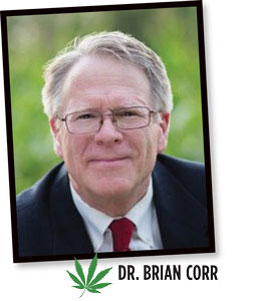11/1/2021
Checking Out the Elephant
Dr. Brian Corr

Have you heard the parable of the blind men and the elephant? It dates back at least 2,500 years, probably more. I’ve told it many times in many different contexts. In brief, it goes something like this:
A bunch of blind men hear about something called an elephant, but have no knowledge of what it is, so they go off to learn about an elephant. One guy bumped into a leg and immediately understood what an elephant is. He had felt trees before and he knew that an elephant was like a tree. Another guy grabbed hold of the elephant’s trunk and immediately knew that an elephant is some sort of wrinkly snake. Another one felt the tail and understood the elephant to be like a rope that moves. Another ran his hands along a tusk and knew an elephant was like a spear.
Each based his conclusion regarding the nature of elephants on sound observations and past experience. And each was correct in a tiny, partial way. But each was very, very wrong overall.
Many people are groping around blindly to compare the cannabis industry to things they know. To some, the cannabis industry is like traditional horticulture. I must confess that in my blindness I fall back on what I know best, which is traditional horticulture, and most often compare the cannabis industry to horticulture.
And why shouldn’t I? I can defend my understanding of the cannabis industry as a type of horticulture. Cut flower growers routinely grow plants to produce a flower at the end of a stem. A cut flower plant is of minimal value, but the flower at the end of the stem is what matters, just like a cannabis inflorescence at the top of a cannabis plant. Horticulturists fine-tune temperature, humidity, nutrients, daylength, etc. to produce the highest-quality plants. So do cannabis growers.
However, the beauty of cannabis flowers is of lesser importance than the components it contains. And we don’t smoke roses. Since cannabis gets smoked, cannabis is like tobacco, right?
Not only is cannabis like tobacco in that it’s smoked, but cannabis and tobacco both contain compounds that influence human physiology. The nicotine in tobacco is psychoactive, causing mild stimulation, an increase in the ability to concentrate and relaxation in many users. The cannabinoids in cannabis are also psychoactive, with effects ranging from reduction of anxiety to paranoia and everything in between.
Both cannabis and tobacco can be consumed in many different forms. Tobacco can be smoked, chewed or even consumed by snorting snuff. Besides smoking, cannabis is consumed as edibles, tinctures and in myriad other ways.
These similarities undoubtedly are behind the decisions of tobacco companies like Altria (Marlboro, Benson & Hedges, Virginia Slims and others) and British American Tobacco (Kent, Lucky Strike, Pall Mall and others) to make significant investments in cannabis companies.
But others say the cannabis industry is like the pharmaceutical industry and there’s good reasoning behind that. The U.S. government itself holds a patent on the use of cannabinoids for “… the treatment of neurodegenerative diseases, such as Alzheimer’s disease, Parkinson’s disease and HIV dementia.” The first state-legal uses of cannabis in the United States were specifically for the treatment of certain medical conditions. Cannabidiol (CBD) is the active ingredient in the FDA-registered pharmaceutical Epidiolex used to treat seizures caused by rare forms of epilepsy.
But pharmaceuticals aren’t smoked, are usually purified compounds and there are no pharmaceuticals that are used (legally) for recreational purposes. Since cannabis can be used for recreational purposes, it sounds more like a product from the alcohol industry.
Maybe that similarity is what got the attention of the alcohol industry. When Constellation Brands (Corona, Modelo, Kim Crawford, Robert Mondavi, etc.) bumped into the cannabis industry, their perception was an industry like their own. Constellation owns 40% of the Canadian cannabis company Canopy Growth and has the option to control a majority share.
Beer companies also look at cannabis and see their industry. Lagunitas sells Hi-Fi Hops, a cannabis-infused sparkling water with as much as 10 mg of THC in a 12-ounce bottle. Pabst also has a seltzer with 10 mg of THC per 12-ounce can. Molson Coors has a whole range of cannabis-infused beverages.
Like alcoholic beverages, cannabis is often consumed in social settings. Pre-COVID, passing a joint or a pipe among friends was a common practice. Sadly, solitary consumption of both cannabis and alcohol has increased. In many cases, this leads to excessive levels of consumption. Pre-mixed alcoholic cocktails allow drinkers to bypass the bar and drink at home. Some cannabis shops have what they call “dog-walker” pre-rolled joints. The name originated because the quantity was small enough to be smoked while walking a dog, but is the amount a person might consume when alone.
Is the cannabis industry like horticulture, tobacco, pharmaceuticals or alcohol? Like the blind men and the elephant, each of these viewpoints is partially correct, but none sees the entire animal. The cannabis industry has commonalities with all of these industries, but is unique in its own way. All these industries will contribute to the development of professional cannabis, but the cannabis industry is growing so rapidly it’s an elephant all to itself. GT
Dr. Brian Corr is a consultant with more than four decades of experience in the greenhouse industry. He has advised legal cannabis producers for the last seven years. You can reach him at Brian.Corr@SycamoreHortConsulting.com.